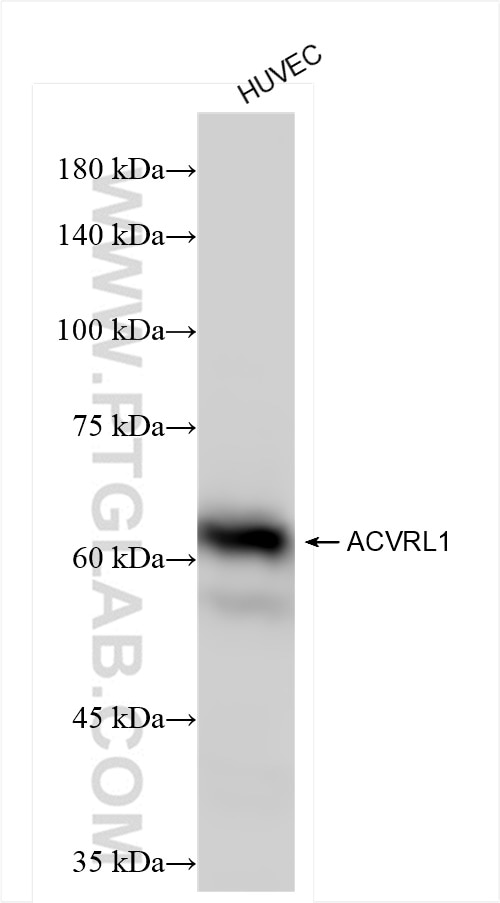Tested Applications
| Positive WB detected in | HUVEC cells |
Recommended dilution
| Application | Dilution |
|---|---|
| Western Blot (WB) | WB : 1:1000-1:4000 |
| It is recommended that this reagent should be titrated in each testing system to obtain optimal results. | |
| Sample-dependent, Check data in validation data gallery. | |
Product Information
84421-3-RR targets ACVRL1 in WB, ELISA applications and shows reactivity with human samples.
| Tested Reactivity | human |
| Host / Isotype | Rabbit / IgG |
| Class | Recombinant |
| Type | Antibody |
| Immunogen | FusionProtein Predict reactive species |
| Full Name | activin A receptor type II-like 1 |
| Calculated Molecular Weight | 56 kDa |
| Observed Molecular Weight | 63 kDa |
| GenBank Accession Number | BC042637 |
| Gene Symbol | ACVRL1 |
| Gene ID (NCBI) | 94 |
| RRID | AB_3671949 |
| Conjugate | Unconjugated |
| Form | Liquid |
| Purification Method | Protein A purfication |
| UNIPROT ID | P37023 |
| Storage Buffer | PBS with 0.02% sodium azide and 50% glycerol , pH 7.3 |
| Storage Conditions | Store at -20°C. Stable for one year after shipment. Aliquoting is unnecessary for -20oC storage. 20ul sizes contain 0.1% BSA. |
Background Information
ACVRL1 (ALK1) is a type I cell-surface receptor for the TGF-beta superfamily of ligands. It shares with other type I receptors a high degree of similarity in serine-threonine kinase subdomains, a glycine- and serine-rich region (called the GS domain) preceding the kinase domain, and a short C-terminal tail. ACVRL1 is highly expressed in endothelial cells and has a critical role in the control of blood vessel development and repair (PMID: 8640225). Mutations in the ACVRL1 gene are associated with hemorrhagic telangiectasia type 2.
Protocols
| Product Specific Protocols | |
|---|---|
| WB protocol for ACVRL1 antibody 84421-3-RR | Download protocol |
| Standard Protocols | |
|---|---|
| Click here to view our Standard Protocols |



